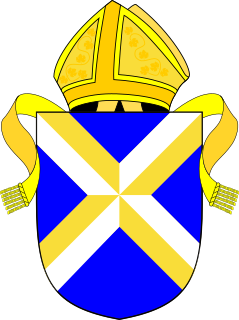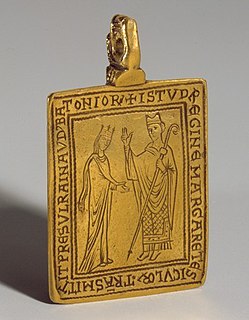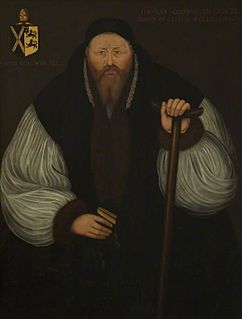
Bath Abbey is a parish church of the Church of England and former Benedictine monastery in Bath, Somerset, England. Founded in the 7th century, it was reorganised in the 10th century and rebuilt in the 12th and 16th centuries; major restoration work was carried out by Sir George Gilbert Scott in the 1860s. It is one of the largest examples of Perpendicular Gothic architecture in the West Country. The medieval abbey church served as a sometime cathedral of a bishop. After long contention between churchmen in Bath and Wells the seat of the Diocese of Bath and Wells was later consolidated at Wells Cathedral. The Benedictine community was dissolved in 1539 during the Dissolution of the Monasteries.
Robert Burnell was an English bishop who served as Lord Chancellor of England from 1274 to 1292. A native of Shropshire, he served as a minor royal official before entering into the service of Prince Edward, the future King Edward I of England. When Edward went on the Eighth Crusade in 1270, Burnell stayed in England to secure the prince's interests. He served as regent after the death of King Henry III of England while Edward was still on crusade. He was twice elected Archbishop of Canterbury, but his personal life—which included a long-term mistress who was rumoured to have borne him four sons—prevented his confirmation by the papacy. In 1275 Burnell was elected Bishop of Bath and Wells, after Edward had appointed him Lord Chancellor in 1274.

Wells Cathedral is an Anglican cathedral in Wells, Somerset, England, dedicated to St Andrew the Apostle and seat of the Bishop of Bath and Wells, whose cathedra it holds as mother church of the Diocese of Bath and Wells. Built from around 1175 to replace an earlier church on the site since 705, it is moderately sized for an English cathedral. Its broad west front and large central tower are dominant features. It has been called "unquestionably one of the most beautiful" and "most poetic" of English cathedrals.

The Roman Catholic Diocese of Clifton is a Roman Catholic diocese centred at Cathedral Church of Saints Peter and Paul in Clifton, England.

Arthur Lake was Bishop of Bath and Wells and a translator of the King James Version of The Bible.

The Diocese of Bath and Wells is a diocese in the Church of England Province of Canterbury in England.

Reginald fitz Jocelin was a medieval Bishop of Bath and an Archbishop of Canterbury-elect in England. A member of an Anglo-Norman noble family, he was the son of a bishop, and was educated in Italy. He was a household clerk for Thomas Becket, but by 1167 he was serving King Henry II of England. He was also a favourite of King Louis VII of France, who had him appointed abbot of the Abbey of Corbeil. After Reginald angered Becket while attempting to help negotiate a settlement between Becket and the king, Becket called him "that offspring of fornication, that enemy to the peace of the Church, that traitor." When he was elected as a bishop, the election was challenged by King Henry's eldest son, Henry the Young King, and Reginald was forced to go to Rome to be confirmed by Pope Alexander III. He attended the Third Lateran Council in 1179, and spent much of his time administering his diocese. He was elected Archbishop of Canterbury in 1191, but died before he could be installed.
Jocelin of Wells was a medieval Bishop of Bath. He was the brother of Hugh de Wells, who became Bishop of Lincoln. Jocelin became a canon of Wells Cathedral before 1200, and was elected bishop in 1206. During King John of England's dispute with Pope Innocent III, Jocelin at first remained with the king, but after the excommunication of John in late 1209, Jocelin went into exile. He returned to England in 1213, and was mentioned in Magna Carta in 1215.
Savaric fitzGeldewin was an Englishman who became Bishop of Bath and Glastonbury in England. Related to his predecessor as well as to Emperor Henry VI, he was elected bishop on the insistence of his predecessor, who urged his election on the cathedral chapter of Bath. While bishop, Savaric spent many years attempting to annexe Glastonbury Abbey as part of his bishopric. Savaric also worked to secure the release of King Richard I of England from captivity, when the king was held by Emperor Henry VI.

Thomas Godwin was an English bishop, who presided over the Diocese of Bath and Wells.
Ivor Verdun Powell, MBE was a Welsh footballer who gained eight Welsh caps and later became a manager.
John of Tours or John de Villula (died 1122) was a medieval Bishop of Wells in England who moved the diocese seat to Bath. He was a native of Tours and was King William I of England's doctor before becoming a bishop. After his consecration as bishop, he was either given or purchased Bath Abbey, a rich monastery, and then moved the headquarters of the diocese from Wells, to the abbey. He rebuilt the church at Bath, building a large cathedral that no longer survives. He gave a large library to his cathedral and received the right to hold a fair in Bath. Not noted for his scholarship, he died suddenly in 1122.

The Dean of Wells is the head of the Chapter of Wells Cathedral in the Mendip district of Somerset, England. The dean's residence is The Dean's Lodging, 25 The Liberty, Wells.

William of Wrotham or William de Wrotham was a medieval English royal administrator and clergyman. Although a late 13th-century source says that William held a royal office under King Henry II of England, the first contemporary reference to William is in 1197, when he became responsible for, among other things, the royal tin mines. He also held ecclesiastical office, eventually becoming Archdeacon of Taunton, and served King John of England as an administrator of ecclesiastical lands and a collector of taxes.

The Bishop of Bristol heads the Church of England Diocese of Bristol in the Province of Canterbury, in England.
Ruth Elizabeth Worsley, is a Church of England bishop. Since September 2015, she has been the Bishop of Taunton, a suffragan bishop of the Diocese of Bath and Wells. From 2013 to 2015, she was Archdeacon of Wiltshire.
John Harverd Davies DL is a British Anglican priest and academic. Since 2016, he has been the Dean of Wells, the priest first-among-equals at Wells Cathedral and the most senior priest in the Diocese of Bath and Wells. He previously served as Dean of Derby since 2010.
Noel Michael Roy Beasley is a British Church of England bishop and epidemiologist. Since May 2015, he has been the Bishop of Hertford. From 2003 to 2010, he worked at Westcott House, Cambridge, an Anglican theological college, first as chaplain and then as a tutor and the college's vice-principal. During this time, he was also an academic of Imperial College London. From 2010 to 2015, he was Director of Mission for the Diocese of Oxford.
The Venerable James Bond was an Anglican priest in England during the mid 16th Century.
Catherine Ann Sourbut Groves is a British Anglican priest. Since November 2020, she has served as Archdeacon of Lindisfarne in the Church of England's Diocese of Newcastle. She had previously worked in academia and administration at the University of Bath, and in parish ministry in the Diocese of Bath and Wells









